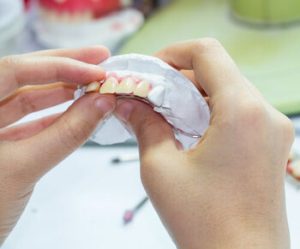Maintaining denture cleanliness is essential not just for appearance, but for comfort and oral health too. When dentures become stained, they may begin to feel less fresh, fit differently, or affect confidence. If you are wondering how to get your dentures clean again without damaging them, here is a guide that addresses everything from tools to techniques.
Choose the Right Tools for the Job
Badly stained dentures need more than just a quick rinse. Selecting the proper cleaning tools is the first step in bringing back their original clarity and feel.
Use a Soft Bristled Toothbrush or Denture Brush
Always opt for a soft bristled brush or a brush made specifically for dentures. These tools can gently clean without scratching the denture surface or irritating nearby gums. Avoid regular hard brushes as they may wear down the outer layer or cause small cracks over time. A soft toothbrush can also reach around contours, helping dislodge stubborn build-up. Rinsing the brush before and after use ensures you are not reapplying food debris during cleaning.
 Avoid Abrasive Cleaning Materials
Avoid Abrasive Cleaning Materials
While it might be tempting to use strong powders or gritty pastes, abrasive cleaning materials can do more harm than good. These products may scratch artificial teeth and compromise the smooth surface that resists future stains. Scratches not only collect plaque and food particles but may reduce how well dentures fit. Stick to products designed for denture care and avoid any solution that feels gritty between your fingers.
Remove Stains Effectively with Targeted Techniques
Stains often develop gradually and may resist routine brushing alone. Knowing how to apply cleaning techniques that break down stains without damaging materials is key.
Use a Safe Denture Cleaning Solution
A denture cleaning solution is formulated to remove stains safely. Soak your dentures in the solution for the time specified in the manufacturer’s instructions. The active ingredients help dissolve hardened food debris and discolouration without altering the denture structure. These solutions are a convenient option when brushing alone is no longer enough.
Try Baking Soda as a Gentle Alternative
Baking soda can work wonders in breaking down minor stains. Mix a small amount with warm water to form a paste and apply it with a soft brush. Gently clean around the base and artificial teeth, avoiding excessive pressure. While baking soda is not a replacement for proper cleansers, it can help between more thorough treatments. Ensure it is completely rinsed away before placing dentures back in your mouth.
Clean Thoroughly Without Damaging the Dentures
Handling stained dentures requires a balance between thoroughness and care. Applying pressure in the wrong way or using the wrong temperature can reduce their life span.
Use Warm Water, Not Hot
Always rinse and soak dentures in warm water, never hot. Hot water may cause certain materials to warp, especially in removable dentures made from acrylic. Warm water helps soften sticky residues while keeping the denture frame intact. Rinse the dentures before and after every cleaning session to flush out any loosened particles. Clean water also prevents build-up from resettling.
Rinse After Every Meal to Prevent Further Stains
Develop the habit of rinsing your dentures with water after eating. This helps remove loose food particles before they harden and stain. Rinsing also reduces the risk of gum inflammation caused by bacteria left behind on the denture surface. Even if you cannot brush right away, a good rinse keeps residue from settling between artificial teeth or under the plate.
Maintain Denture Cleanliness Daily for Lasting Results
Preventing future staining requires consistent effort. Denture care does not stop at occasional deep cleans; it is a daily habit that supports comfort and oral hygiene.
Clean Every Part, Not Just the Teeth
Whether you wear partial dentures or complete false teeth, each part of the appliance should be cleaned. That includes the base, clasps, and every crevice along the denture frame. Stains can form in places you do not see, especially in the corners of partial denture connectors. Use a soft-bristled brush with curved edges for better reach.
Follow the Manufacturer’s Soaking Instructions
Soaking solutions vary depending on the material your denture is made from. Always read and follow the manufacturer’s instructions. Some dentures may contain metal components or delicate finishes that require shorter soak times. Misusing a cleanser, even a gentle one, can lead to dullness or reduced flexibility. If you are unsure, ask your prosthetist which product suits your denture type.
When Routine Cleaning Is Not Enough
In some cases, deep stains may not respond to home treatments. If brushing and soaking do not restore denture clarity, it may be time to seek professional assistance.
Schedule a Professional Cleaning

Watch for Signs That Cleaning Is Not Working
If you still notice discolouration after trying different methods, it may indicate deeper staining or surface damage. Discoloured spots that remain despite proper denture cleaning may require adjustment or replacement. Never try to scrape the stain off using sharp tools, as this can lead to irreversible damage. Instead, bring the denture in for a professional evaluation.
Schedule a Professional Denture Assessment Today
Denture maintenance is more than just keeping things clean; it is part of keeping your gums healthy and your confidence high. Consistent cleaning routines can help prevent issues such as bad breath, gum disease, and future staining. If you wear dentures regularly, your cleaning habits directly affect how natural they feel and how long they last.
Remember, dentures clean properly are more comfortable to wear and easier to maintain. Whether you are dealing with a partial denture or full removable dentures, the right care goes a long way in protecting both your oral health and your peace of mind. To receive personalised guidance and professional support, book a consultation at our clinic. Our team is ready to help you keep your dentures fresh, stain-free, and comfortable for daily use. Call us today on (07) 5317 1023 or (07) 5315 8076 to schedule your appointment.
References
https://www.colgate.com/en-in/oral-health/dentures/how-to-clean-dentures-to-avoid-bacteria-buildup
https://www.healthline.com/health/denture-care


 Avoid Abrasive Cleaning Materials
Avoid Abrasive Cleaning Materials


Recent Comments